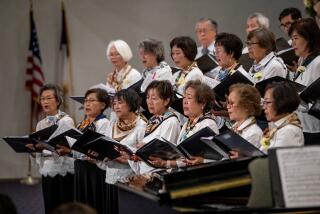Chinese police detain members of unregistered church
- Share via
Reporting from Beijing — Chinese police on Sunday detained more than 100 churchgoers who tried to hold an outdoor prayer service on a pedestrian bridge in Beijing after having failed to secure permission to open a church.
Although it is not uncommon for police to raid unregistered churches, the bust in the very heart of the capital suggests that the dragnet around activists, bloggers, lawyers and intellectuals now includes Christian groups that in the past were able to slide under the radar.
The 8-year-old Shouwang Church, with a congregation of about 1,000, has been popular among young professionals and academics. In recent years it has complained that the government was pressuring landlords not to rent the group space in various hotels and office buildings where they wanted to hold services.
Alerted by text messages and emails that churchgoers would start gathering at 8:30 a.m., police swarmed around the designated meeting point: an elevated walkway between two office buildings near Beijing’s university neighborhood in Haidian District.
“Some followers who gathered at the original meeting point were dispersed by a group of plainclothes police officers who stormed in like wolves and tigers,” one Christian activist wrote on Twitter.
More than 100 people were loaded onto buses and vans, some of them singing hymns as they were taken away, according to the China Aid Assn., a U.S.-based Christian group. Cellphone coverage was cut off in the area, apparently to prevent news of the detentions from spreading. Most of those detained were taken to a nearby school for questioning and released. But the pastor, Jin Tianming, was reported by the group to be under house arrest.
“By using force today in the capital of China to prevent Shouwang Church members from following their conscience … the Beijing authorities have again demonstrated their total disregard of their citizens’ constitutionally guaranteed fundamental right to religious freedom,” China Aid President Bob Fu said in a statement.
Shouwang Church leaders could not be reached for comment and a website for the church had been taken down.
China has an estimated 40 million to 60 million Christians, the majority of them members of so-called house churches, which operate in office buildings, hotels and private homes outside the auspices of government-sanctioned churches. In some parts of the country, these unregistered churches flourish without interference from the Communist Party; in others, pastors are subject to arrest and harsh prison terms.
“The authorities give more slack to religious organizations than they used to a decade ago, but they want to harness them to state control,” said Nicholas Bequelin, a senior Asia researcher at Human Rights Watch. “Religion is a business now. The government sees that and wants to get in on it. If a church refuses to come into the fold or locks horns with authorities, persecution can be severe.”
Bequelin said he believed that Sunday’s high-profile raid was part of a crackdown that has been underway since mid-February and seen dozens of arrests of activists and intellectuals, the most prominent being the artist Ai Weiwei, who was detained a week earlier at the Beijing airport.
The circumstances of this latest bust were similar to those of past Sundays when security personnel have blanketed popular gathering places to prevent demonstrations of solidarity with those seeking greater human rights in the Middle East.
The Shouwang Church denied any political motives. In an open letter last week, it said it had spent more than $4 million for space to hold services in an office building but that the landlord had refused to turn over the key because of government pressure.
“The members of our church will do our level best to keep our church from being tainted by the current political fever, but whether we can successfully avoid it is not determined by us,” the letter says. “Because of all the doors that have been closed to us, the church no longer has a place to worship.”
In 2009, the Shouwang Church held a similar outdoor prayer meeting without interference from Chinese authorities.
More to Read
Sign up for Essential California
The most important California stories and recommendations in your inbox every morning.
You may occasionally receive promotional content from the Los Angeles Times.













